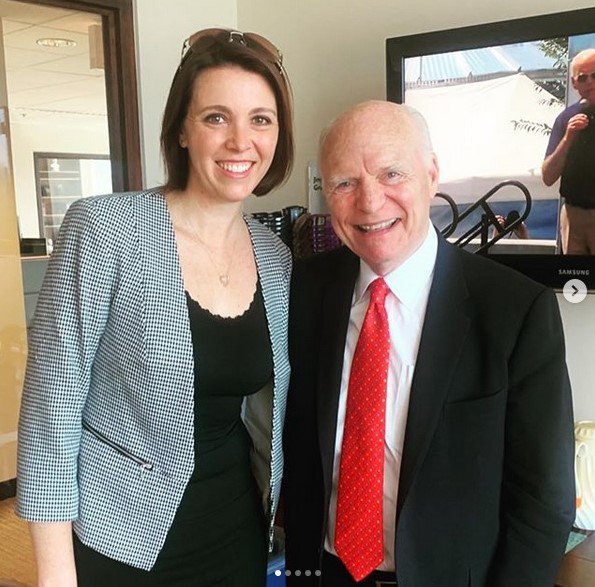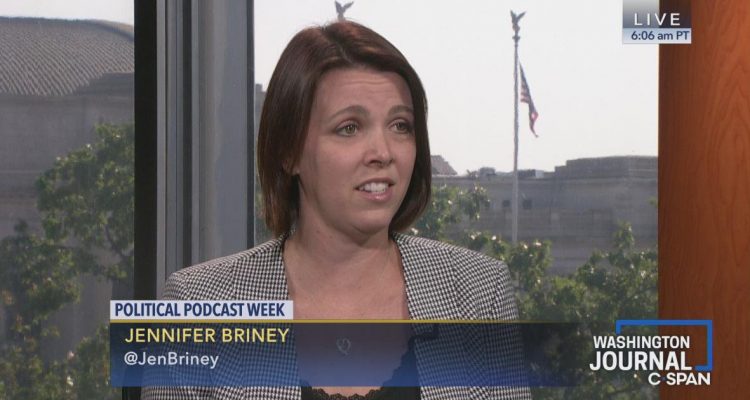You're starting a podcast and (ugh) want to know how to profit from it, but Jen Briney monetized her podcast without corporate sponsors. So, while newbies shouldn't even be thinking that far out yet, know that there most certainly are myriad ways to (eventually) bring in dollars from your show. In other words, it's not just sponsors-or-bust.
Jen Briney’s podcast, Congressional Dish, is essential listening for people who want to know what’s happening in the halls of Congress. Fiercely independent and driven by Jen’s passion for research, each episode breaks down complex legislation and spotlights news from the House and Senate.
This labor of love has been Jen’s full-time job since 2012. But instead of having corporate sponsors, Jen relies on her listeners to support the podcast.
Here’s how she makes it work while still having time to read every word of the Congressional bills she discusses on the show.
Starting without a monetization plan
When Jen started Congressional Dish, she and her husband decided to test the format for a year. “We decided to take the financial pressure off of it,” she said, and they agreed she wouldn’t initially try to make money from the show.
When she started monetizing in late 2013, she set up a PayPal account. Listeners contributed about $25 in monthly subscriptions, which paid her hosting costs. That foundation grew slowly but steadily, Jen said, in part because she was honest with listeners — especially when her husband became unemployed and the pair had to move across the country.
Jen waited tables for nine months while also working on Congressional Dish. She said her listeners understood the situation because of how open she’d always been on the show.
Along the way, Jen met Adam Curry and John C. Devorak, cohosts of the news podcast No Agenda. They gave her a piece of advice from their own business model: Ask the audience to provide value in exchange for the value they get from listening to the show.
“Any way the audience wants to give you money, just set it up,” they advised.
More contribution options = more podcast revenue
Her loyal audience has plenty of options for contributing to Congressional Dish. Jen has a post office box where listeners can send physical checks or money orders. She also takes Venmo, Zelle, CashApp, Venmo, Bitcoin and more.
Sometimes listeners even send gift cards. One listener buys her dog’s food from her Amazon wish list. “It’s really interesting how people contribute in ways that are meaningful for them, in ways that I'm not even suggesting,” Jen said.
When listeners asked her to set up a Patreon, Jen was hesitant. She didn’t want to overwhelm her audience with options for supporting the show. But Patreon’s model of allowing people to contribute per episode allowed her to segment her audience to meet specific goals or listener requests.
So many people submit contributions and letters of support that she now hosts entire dedicated episodes to thank her contributors.
“It’s really important to me to thank every single person,” she said. “And so right now if you donate a thousand or if you donate a dollar, you're going to be thanked on there.”

The ‘value for value’ approach for monetizing a podcast
If Jen had a moment of overnight success, it was when she did a Reddit AMA in 2015. The question-and-answer session catapulted Congressional Dish to a new level of visibility — attracting 30,000 downloads in a single day. It also added significantly to her revenue and she used some of the earnings for marketing expenses.
But in 2017, Apple changed the way it recorded podcast downloads, which throttled Jen’s download statistics as it did for so many other podcasters.
“I’m still dealing with the fallout of that because I thought my audience was at one level and now I know it’s not,” she said.
Some of Jen’s podcasting friends — who relied on the CPM advertising model — got hit financially by the reporting change. But since she hadn’t gone the advertising route, Jen’s show didn’t suffer that fate. “I remember telling my audience that I had never been more thankful for my funding model in my life,” she said.
Instead of worrying about download growth, she focuses on financial growth to measure the ongoing success of Congressional Dish. She earns about $7,000 per month from contributors but spends about $3,000 per month on expenses, which include virtual assistants to provide detailed citations for her show notes.
Jen identified two factors that make the value-for-value model ideal for her show.
- She’s not beholding to traditional sponsors. “There’s really no one person that can break this show,” she said. “And that’s my favorite thing, because I’m always going to say something that someone finds controversial. There’s no way around it with my topic.” As much as she works to present information fairly, she’s all too familiar with political TV shows that have had their sponsorships pulled because of an unpopular opinion shared by the host.
2. Diversification of payment options means that she’s not completely reliant on any one of them. For example, Jen said her revenue comes primarily from Patreon and mailed checks right now. But Patreon takes about 9% of subscriber revenue in fees, so she doesn’t really want Patreon to be her top source of funds.
Another plus about her model: the flexibility of how and when listeners contribute ensures her show is open to a wide range of listeners. “I believe really strongly that [the listener] should get to choose what number financially my podcast is valued at for them,” Jen says.
She has people who contribute whenever they feel like it, which have been some of her highest contributors. She’s had students who have rustled up the change from between couch cushions and contributed that. “When I say the only number I feel is unfair is zero, as long as they’re contributing and they feel like what they are doing is fair, then I completely agree with that,” she said.
Jaclyn Schiff is the founder of PodReacher, a service that turns podcast episodes into high-quality articles to grow your podcast.






1 Comment on "How Jen Briney Monetized Her Podcast Without Corporate Sponsors"